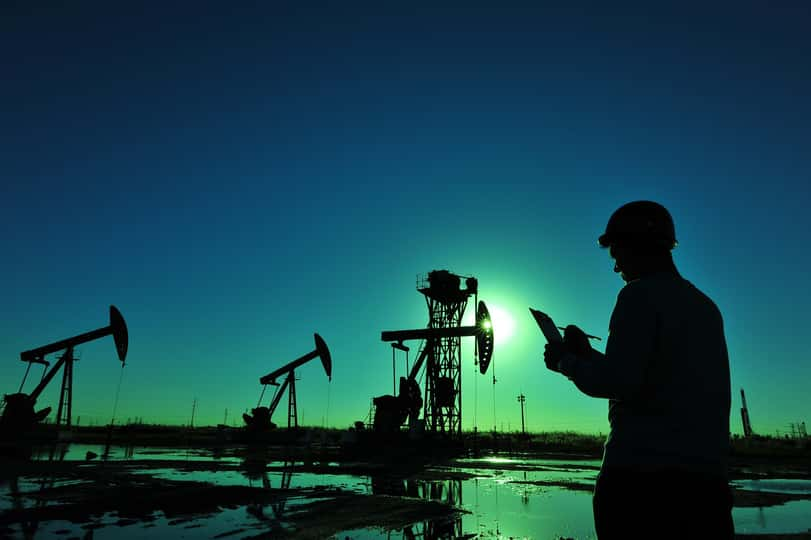Despite the global push toward sustainability, the resilient oil and gas demand signifies a potential escalation in non-renewable resource consumption. Given this backdrop, it could be wise to add fundamentally robust energy stocks Baker Hughes Company (BKR - Get Rating), Sasol Limited (SSL - Get Rating), and CrossAmerica Partners LP (CAPL - Get Rating) to your portfolio now.
Nations worldwide have pledged to achieve net-zero emissions, intensifying the transition toward renewable energy. Yet, despite this notable shift toward cleaner energy alternatives, the global oil and gas demand is projected to remain strong. In 2024, the International Energy Agency (IEA) expects global oil demand to increase by 930,000 bpd.
Forecasters predict milder temperatures up to December 23. However, customary cooling patterns might stimulate increased U.S. gas demand within the Lower 48 states, including export demands.
The U.S. is on the brink of surpassing Australia and Qatar to become the leading global LNG supplier by 2023. Escalating oil prices, distribution interruptions, and sanctions related to the ongoing Ukraine conflict have magnified the international demand for U.S. exports.
Oil pricing could increase further due to geopolitical tensions and Saudi Arabia and Russia’s voluntary production cuts. UBS Group AG analysts and The Goldman Sachs Group, Inc. anticipate a possible rise in oil prices triggered by these voluntary restrictions. Predicted Brent oil prices for 2024 are expected to fluctuate between $80 and $100.
Given the industry tailwinds, it’s time to examine the fundamentals of the three stocks within the energy industry.
Baker Hughes Company (BKR - Get Rating)
BKR provides a portfolio of technologies and services to energy and industrial value chains worldwide. It operates through two segments: Oilfield Services & Equipment (OFSE) and Industrial & Energy Technology (IET).
On November 17, BKR paid a quarterly cash dividend of $0.20 per share of Class A common stock. The company has paid dividends for 34 consecutive years.
Its annualized dividend rate of $0.80 per share translates to a dividend yield of 2.38% on the current share price. Its four-year average yield is 3.66%. BKR’s dividend payments have grown at CAGRs of 2.7% and 1.6% over the past three and five years, respectively.
On November 2, BKR’s Akastor ASA’s 50% owned affiliate HMH Holding B.V. successfully completed a $200 million senior secured bond issue with a tenor of 3 years and a fixed coupon of 9.88% per annum.
The net proceeds from the bonds will be applied toward (i) settlement in full of HMH’s existing $150 million senior secured bond issue, (ii) full repayment of existing bank borrowings, and (iii) general corporate purposes.
BKR’s trailing-12-month cash from operations of $3.03 billion is 352.4% higher than the industry average of $669.40 million, while its trailing-12-month asset turnover ratio of 0.71x is 28.7% higher than the industry average of 0.55x.
In the fiscal third quarter that ended September 30, 2023, BKR’s revenue and adjusted operating income increased 23.7% and 42.3% year-over-year to $6.64 billion and $716 million, respectively. Moreover, its free cash flow stood at $592 million, up 42% from the year-ago quarter.
For the same quarter, adjusted net income attributable to BKR and adjusted earnings per share stood at $427 million and $0.42, up 61.7% and 61.5% from the prior-year quarter, respectively.
Street expects BKR’s revenue and EPS for the fiscal fourth quarter ending December 2023 to increase 17.6% and 26.1% year-over-year to $6.94 billion and $0.48, respectively. The company surpassed consensus revenue and EPS estimates in three of the trailing four quarters, which is impressive.
The stock has gained 25.1% over the past nine months to close the last trading session at $33.58. Over the past year, it has gained 15.6%.
BKR’s POWR Ratings reflect its positive prospects. The stock has an overall B rating, equating to Buy in our proprietary rating system. The POWR Ratings are calculated by considering 118 distinct factors, with each factor weighted to an optimal degree.
The stock has an A grade for Growth and a B for Momentum and Sentiment. Within the Energy – Oil & Gas industry, it is ranked #12 out of 85 stocks.
To see additional POWR Ratings for Value, Stability, and Quality for BKR, click here.
Sasol Limited (SSL - Get Rating)
Headquartered in Johannesburg, South Africa, SSL operates as an integrated chemical and energy company. Its segments include Advanced Materials; Base Chemicals; Essential Care Chemicals; and Performance Solutions.
On October 23, Sasol Chemicals, a business unit of SSL, launched CARINEX and LIVINEX, two brands that will expand Sasol’s offerings of sustainable products. Sasol Chemicals previously announced plans to begin exploring alternatives to traditional surfactants.
On October 20, SSL and the Council of Geoscience (CGS) signed a Memorandum of Understanding (MoU) to collaborate, explore, and develop carbon capture and utilization and storage (CCUS) potential in South Africa. This partnership marks another step in accelerating the trajectory toward achieving a low-carbon economy via strategic initiatives.
Its annualized dividend rate of $0.91 per share translates to a dividend yield of 9.76% on the current share price. Its four-year average yield is 2.54%.
SSL’s trailing-12-month cash from operations of $1.88 billion is 352.7% higher than the industry average of $415.73 million. Its trailing-12-month gross profit and EBIT margins of 42.22% and 18.81% are 48.5% and 65.3% higher than the industry averages of 28.43% and 11.38%, respectively.
During the first quarter of 2024, SSL’s mining productivity of 1025 t/cm/s is 9.2% year-over-year. Internal sales of fuels were 5.4 mm tons, up 1.9% year-over-year. Also, in Mozambique, the gas production for the first quarter was 11% higher than the previous year due to increased gas availability from the additional wells online.
In the fiscal year that ended June 30, 2023, SSL’s turnover and operating profit before remeasurement items increased 6.2% and 7.6% year-over-year to R289.70 billion ($15.79 billion) and R55.42 billion ($3.02 billion), respectively.
For the same year, earnings for the year and earnings per share stood at R9.33 billion ($508.64 million) and R13.02, respectively. As of June 30, 2023, SSL’s current assets came at R134.22 billion ($7.31 billion), compared to R131.97 billion ($7.19 billion) as of June 30, 2022.
Street expects SSL’s EPS for the fiscal year ending June 2024 to increase 20.4% year-over-year to $3.45 and revenue to increase marginally year-over-year to $15.79 billion.
The stock has declined 1.4% intraday to close the last trading session at $9.31.
SSL’s solid fundamentals are reflected in its POWR Ratings. The stock has an overall rating of B, translating to Buy in our proprietary rating system.
SSL has a B grade for Value and Momentum. Within the B-rated Foreign Oil & Gas industry, it is ranked #17 out of 44 stocks.
Beyond what we’ve stated above, we have also rated the stock for Growth, Stability, Sentiment, and Quality. Get all ratings of SSL here.
CrossAmerica Partners LP (CAPL - Get Rating)
CAPL is involved in the wholesale distribution of motor fuels, operation of convenience stores, and ownership and leasing of real estate used in the retail distribution of motor fuels. The company operates through two segments: Wholesale and Retail.
On November 10, CAPL paid a quarterly dividend of $0.5250 per unit to all unitholders attributable. Its annualized dividend rate of $2.10 per share translates to a dividend yield of 9.68% on the current share price. Its four-year average yield is 11.50%.
CAPL’s trailing-12-month ROCE of 102.13% is 410.8% higher than the industry average of 19.99%, while its trailing-12-month asset turnover ratio of 3.42x is 523.4% higher than the industry average of 0.55x.
In the fiscal third quarter that ended September 30, 2023, CAPL’s operating revenues and gross profit stood at $1.21 billion and $100.44 million, respectively. Moreover, its adjusted EBITDA stood at $44.21 million.
For the same quarter, net income available to limited partners and earnings per common unit stood at $11.66 million and $0.31, respectively. Also, as of September 30, 2023, the company’s total assets stood at $123.26 million, compared to $118.41 million as of December 31, 2022.
Street expects CAPL’s revenue and EPS for the fiscal fourth quarter ending December 2023 to be $1.11 billion and $0.22, respectively. The company surpassed consensus EPS estimates in three of the trailing four quarters.
The stock has gained 9.4% year-to-date to close the last trading session at $21.70. Over the past three months, it has gained 10.4%.
CAPL’s robust prospects are reflected in its POWR Ratings. The stock has an overall A rating, equating to a Strong Buy in our proprietary rating system.
CAPL has an A grade for Growth and Sentiment and a B for Stability. It is ranked #2 out of 26 stocks within the A-rated MLPs – Oil & Gas industry.
Click here for the additional POWR Ratings for CAPL (Value, Momentum, and Quality).
What To Do Next?
Get your hands on this special report with 3 low priced companies with tremendous upside potential even in today’s volatile markets:
3 Stocks to DOUBLE This Year >
Want More Great Investing Ideas?
BKR shares fell $0.03 (-0.09%) in premarket trading Monday. Year-to-date, BKR has gained 16.50%, versus a 24.09% rise in the benchmark S&P 500 index during the same period.
About the Author: Sristi Suman Jayaswal

The stock market dynamics sparked Sristi's interest during her school days, which led her to become a financial journalist. Investing in undervalued stocks with solid long-term growth prospects is her preferred strategy. Having earned a master's degree in Accounting and Finance, Sristi hopes to deepen her investment research experience and better guide investors. More...
More Resources for the Stocks in this Article
| Ticker | POWR Rating | Industry Rank | Rank in Industry |
| BKR | Get Rating | Get Rating | Get Rating |
| SSL | Get Rating | Get Rating | Get Rating |
| CAPL | Get Rating | Get Rating | Get Rating |






